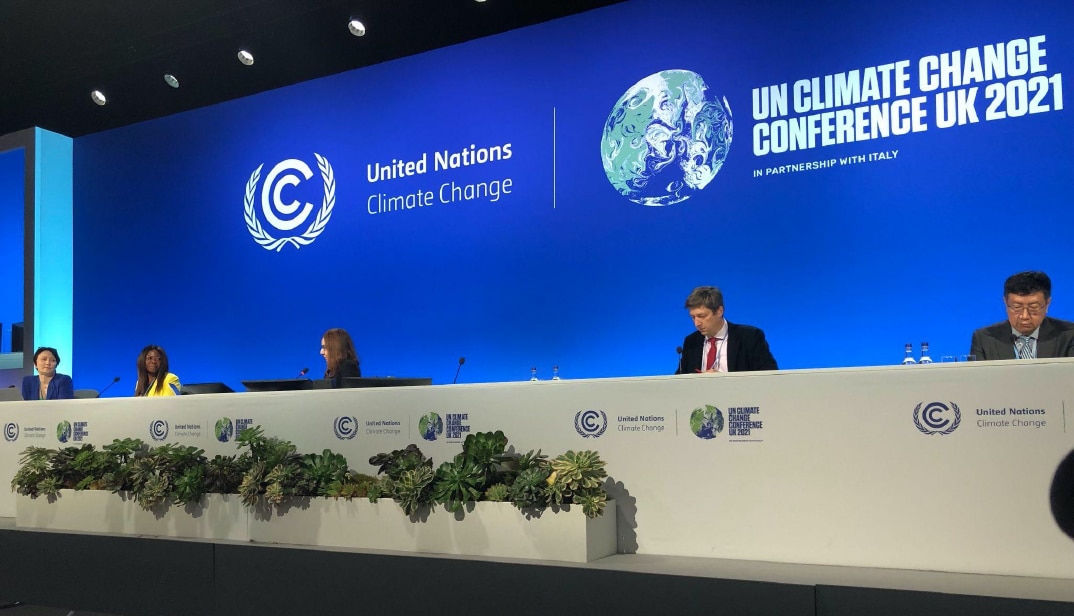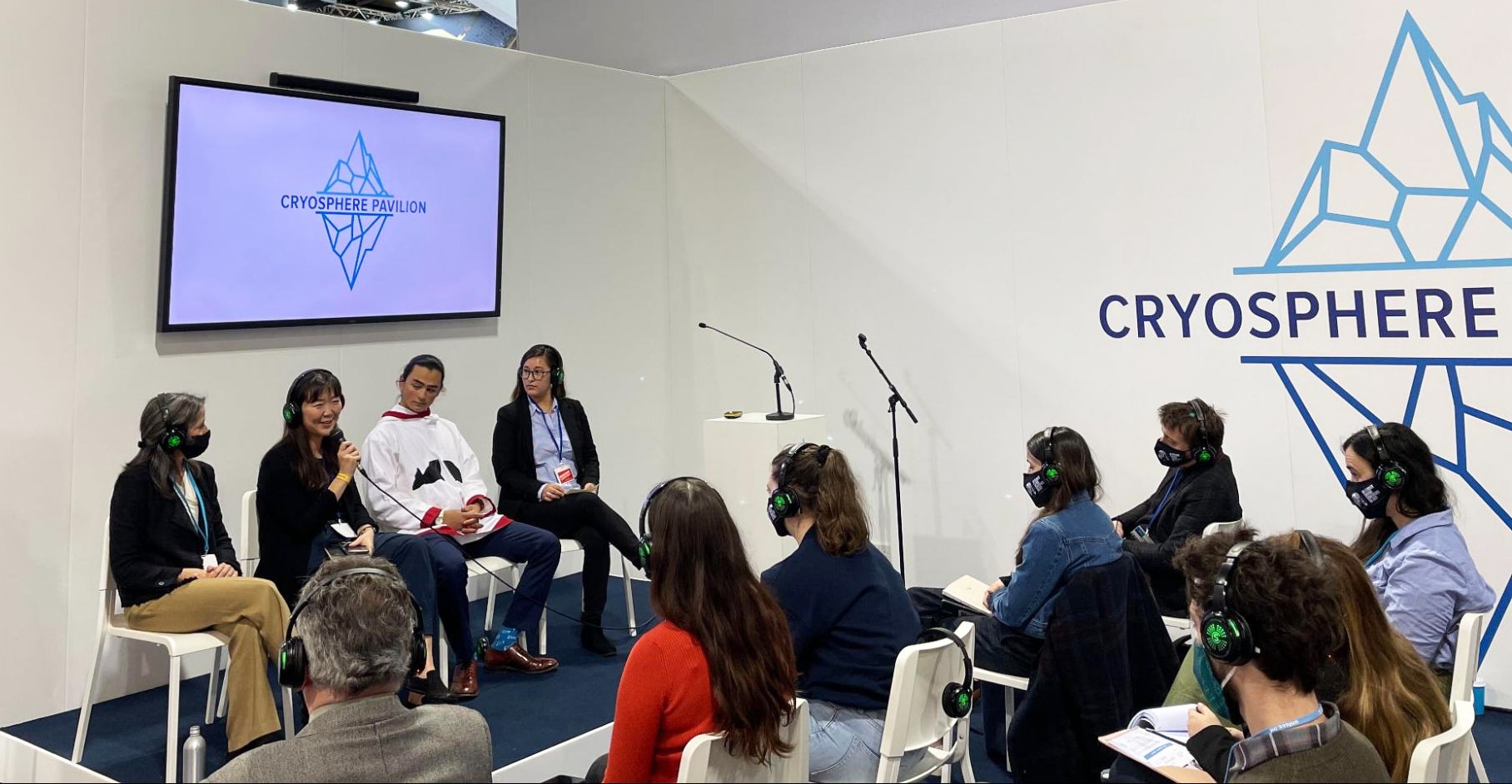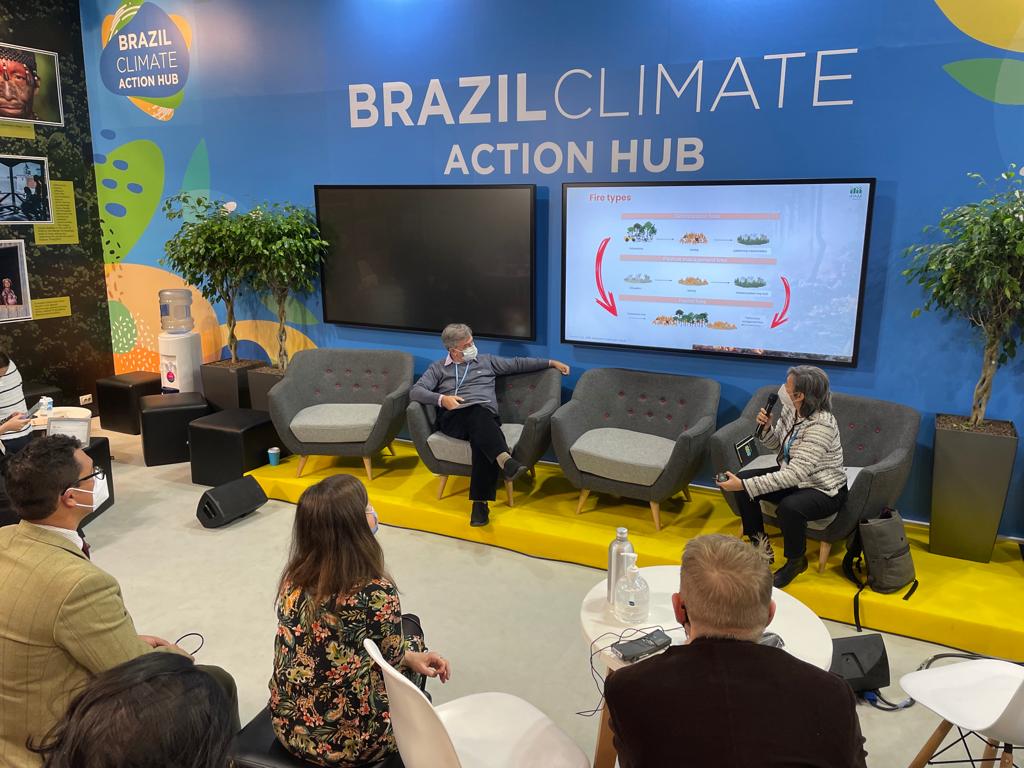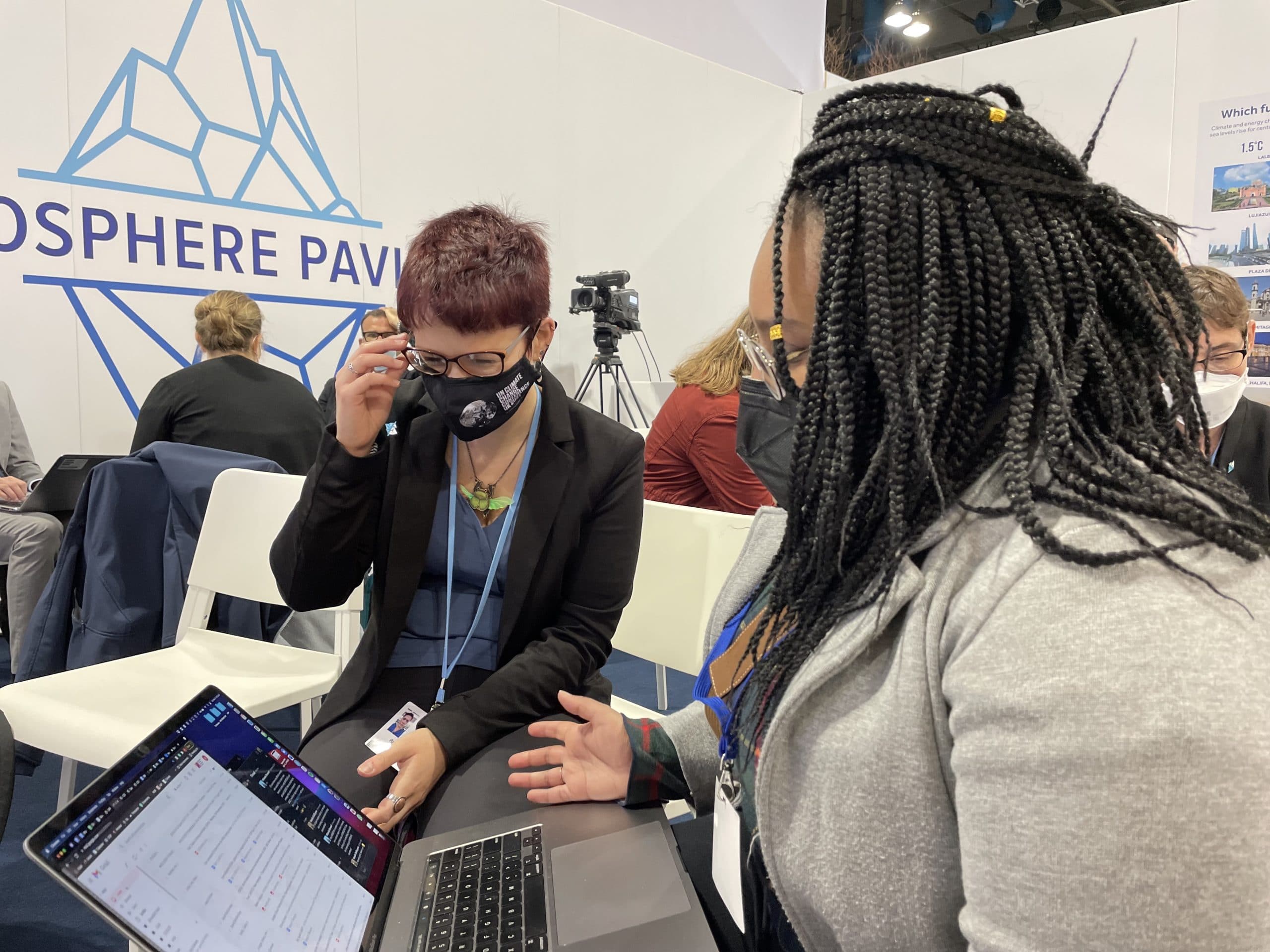That’s all for updates on this year’s COP. Come back next week for a recap of the event’s biggest successes and failures.
In The News
Quick Talk With Dr. Rachel Treharne of the Woodwell Climate Research Center
Time: “Ice and permafrost are infrastructure in the Arctic. So thawing permafrost means literally the ground is collapsing under people’s feet.”
Dr. Rachel Treharne explains why Permafrost is absolutely vital to include in climate policy, from its significance as infrastructure for Northern communities, to the unaccounted-for emissions it could release as it thaws. Read the story.

Risk Panel included (l-r) Dr. Elena Manaenkov (WMO), Thandie Mwape (IFRC), Dr. Katharine Hayhoe (Nature Conservancy), Nick Bridge (UK Special Rep), and Dr. Li Zheng (Tsinghua University).
photo by Natalie Baillargeon
Tuesday, November 9
Woodwell to manage climate risk coalition
Woodwell and the COP26 Presidency released our Recognizing Risk—Raising Climate Ambition report this morning. Woodwell also premiered a video summarizing the report at an event chaired by climate scientist Dr. Katharine Hayhoe. Woodwell’s report summarizes the outcomes from workshops hosted with 13 different high-emitting countries exploring how climate risk information can be delivered more effectively. The four major themes that emerged across the workshops as being crucial to effective risk communication were: creating reports in collaboration with policymakers; localizing risk assessments; standardizing best practices of risk assessments; connecting experts to illustrate cascading risk pathways.
At the end of the panel, Minister Lee Rowley announced that Woodwell will manage a climate risk coalition that will produce an annual climate risk assessment for policymakers. The other organizations that make up the coalition are the Amazon Environmental Research Institute (IPAM), Chatham House, Future Earth, International Network for Government Science Advice (INGSA), International Science Council, Jiangmen Laboratory for Carbon and Climate Science and Technology, World Climate Research Programme and the World Meteorological Organisation.
Members of the Woodwell team also attended the Financing the Amazon conservation: risks and opportunities panel at the Brazil Action Hub, which featured André Guimaraes, the Executive Director of IPAM, and Jenny Xie of Wellington Management, among other panelists. This event highlighted the intersection of businesses and the financial sector with deforestation and introduced the CONSERV program as a way to limit deforestation. The program also underscored the importance of considering how the finance sector can incentivize climate-positive action.
Later at the Brazil Action Hub, Woodwell’s Dave McGlinchey spoke as part of the Why do science-based targets matter? panel. On this panel, McGlinchey shared Woodwell’s recent Climate Risk Assessment in Belém, Brazil, which assessed how climate change is expected to impact temperature, precipitation, and fire season in Belém. “Understanding the full picture of climate risk is incredibly important when you’re setting policy,” explained McGlinchey. “Full insight into scope, scale, and severity of risk is important to motivate ambitious mitigation targets.” Finally, Woodwell’s Dave McGlinchey spoke on the From Words to Action: International Cooperation to Fight Climate Change roundtable. The roundtable featured Russian industry and business leaders, Julie Delongchamp from Wellington Management, and Rob Malin from winemaker When in Rome. The group discussed how climate hazards present risks to their business models, and how some of them are transitioning to adapt to climate change.
Special Update
Report Released: Recognizing Risk—Raising Climate Ambition
The Woodwell risk team released their report today synthesizing the results of a series of climate risk workshops. Woodwell convened over 220 experts from 13 countries to identify both the aspects of climate risk assessments that are most effective at motivating action and those that could be improved. Read the full report.
In The News
COP26 will turn its focus to science and innovation. Here’s what you need to know about the theme
Washington Post: “Decision-makers and community leaders need to be included from the outset of climate risk assessments. That way, ‘you know there’s an audience ready to receive them,’ said David McGlinchey, chief of external affairs at Woodwell.”
Solving climate change will require innovative thinking and sound science. This year, COP26’s science and innovation day turns scientists and negotiators’ attention to the crucial question of how to translate that sound science into climate resilient strategies that decision-makers and their communities will implement. Read the Story
In The News
Dispatches from Glasgow: It’s not easy being green
Politico: “There’s a disconnect between climate risk assessments and climate policy, according to a new report from the Falmouth-based Woodwell Climate Research Center.”
Woodwell’s Dave McGlinchey drives home the need to discuss the Earth’s major tipping points, particularly in the Arctic, where melting permafrost could lead to runaway emissions. Read the story.

CONSERV panel with (l-r) Marcela Paranhos (IDH), Marcelo Stabile (IPAM), Glenn Bush (Woodwell), and Jenny Xie (Wellington).
photo by Anneka Williams
Monday, November 8
Discussions of carbon offsetting focus on ‘additionality’
Woodwell Climate’s Dr. Glenn Bush spoke on a panel with Marcela Paranhos (IDH, The Sustainable Trade Initiative), Marcelo Stabile (IPAM Amazônia), and Jenny Xie (Wellington Management), on the CONSERV program. Woodwell and IPAM have been working to stop forest cover loss together for more than 30 years; in recent years, we have focused on the nexus of agriculture and forest management. CONSERV is a program that compensates rural producers for working to preserve vegetation on land that could be legally deforested.
“This is a huge amount of land that had previously been left out of mainstream policy discussions on how to avoid deforestation,” explained Dr. Bush. Those conversations “were previously focused on avoiding illegal deforestation.” Woodwell works to help CONSERV understand what motivates farmers to take part in this scheme, given that it is voluntary.
Additionality–the concept that emissions reductions in carbon offsetting must conserve forest that is not otherwise protected–is important to effective carbon offsetting and an important part of what makes the CONSERV project effective.
“We need to scale this up,” said CONSERV coordinator Marcelo Stabile. “The challenge is really big, it’s in the order of millions of hectares.”
Natalie Baillargeon also attended a few exciting events at the U.S. Pavillion today. One of the events was a panel discussion, titled Climate Services for Decision Makers. It highlighted NOAA’s commitment to make science accessible with a special focus on their Regional Integrated Sciences and Assessments Program. At the event, Dr. Ned Gardiner said that “science for science is not enough… we need science for society’s sake.”
In The News
Brazilian farmers who protect the Amazon rainforest would like to be paid
Wall Street Journal: “‘Ultimately, farmers are business people making decisions about the bottom line,’ said Glenn Bush, an environmental economist at Woodwell. ‘They have bills to pay and loans
to repay the bank.'”
Providing the right financial incentives could turn Brazilian farmers from deforesters to forest defenders. Read the story.

Side event panel with (l-r) Dave McGlinchey (Woodwell), Dr. Carin Ashjian (WHOI), Darcy L. Peters (Woodwell), Dr. Rachael Treharne (Woodwell), Dr. Sarah Das (WHOI).
photo by Natalie Baillargeon
Thursday, November 5
Dr. Sue Natali speaks at high level panel on risk
Woodwell Climate and the Woods Hole Oceanographic Institution (WHOI) hosted our official UNFCCC side event today, titled Refreeze The Arctic: Increasing our ambition to maintain a safe and stable climate. The panel featured David McGlinchey, Dr. Carin Ashjian (WHOI), Dr. Rachael Treharne, Dr. Sarah Das (WHOI), Darcy L. Peters, and Dr. Richard Camilli (WHOI, participating remotely), who discussed the impacts of a warming Arctic from the local to global consequences.
Arctic BaseCamp, an Arctic science communication organization, hosted the “High-Level Panel on Risk” featuring Woodwell’s Dr. Sue Natali, among other speakers. The event demonstrated a prototype of a new Arctic Risk Platform designed by Arctic BaseCamp. This platform brings together Arctic science (Woodwell contributed to the permafrost content) from different researchers across the Arctic into an online platform where the data is curated in a way aimed at making information about climate risks in the Arctic accessible for business and policy decision-makers. Dr. Natali presented specifically on the global risks of rapid Arctic permafrost thaw. “The current [climate models] are not appropriately accounting for permafrost thaw,” explained Natali. “This places global temperature budgets at risk.”
Following the science presentations, Arctic BaseCamp brought together business leaders to discuss why business and policy decision-makers need better risk platforms.
Woodwell’s longtime Brazilian partner—IPAM Amazônia—hosted a press conference featuring Ane Alencar, IPAM’s Director of Science, and Paulo Artaxo of the University of São Paulo, which discussed deforestation and fires in the Amazon, among other things. Alencar explained that “a little more than half of deforestation is happening on public lands,” which is illegal, and went on to call for “more concrete steps [from the government] on how to tackle deforestation.”

Panel with (l-r) Dr. Susan Natali (Woodwell), Dulma Clark (Vivobarefoot), Sam Schimmel (sponsored by Native Movement), and Darcy Peter (Woodwell) discussing local impacts of climate change.
photo by Anneka Williams
Thursday, November 4
Capacity crowds at Permafrost Day events
Today, Woodwell’s Dr. Susan Natali, Dr. Rachael Treharne, and Research Assistant Darcy L. Peter spoke at the COP26 Cryosphere Pavilion’s Permafrost Day. Peter spoke on the intergenerational justice panel with Ruth Miller from Native Movement and Robbie James from Green New Deal Rising. They addressed the importance of respecting, listening to, and involving indigenous communities in science policy. “If I told you, we have data from 10,000 years written down in a book, the science community would call it the richest data in the world. But, when the data is in the stories–oral–then it becomes undesirable,” Miller explained. “We are the first climate scientists because we rely on the climate. We notice first when the berries change, when salmon counts change, and when permafrost thaws. We have been recording these changes for tens of thousands of years.” Peter agreed: “[Researchers should] develop a project together with indigenous communities; it should be a symbiotic relationship. What good is research if it only benefits researchers?”
In a separate event at the Cryosphere Pavilion, Dr. Natali and Dr. Treharne illustrated how Arctic fires, which are increasing as a result of climate change, will exacerbate permafrost thaw resulting in increased carbon emissions. They focused on the recently released AR6 report, highlighting how it does not incorporate all of the potential carbon emissions from permafrost (as discussed in a Woodwell policy brief). During the presentation, Dr. Treharne expressed the urgency of the situation: “by excluding permafrost emissions, we are ignoring something equivalent to major country’s emission, and we know that the window to reach 1.5°C and 2°C is closing.” The urgency motivates Woodwell’s new platform Unstable Ground that communicates the changing Arctic.
Finally, Peter and Dr. Natali sat on a panel with Dulma Clark from Vivobarefoot and Sam Schimmel from Gambell, Alaska, to discuss the local impacts of climate change in the Arctic. Dr. Natali emphasized that “there is an urgency to get things done, but we need… to listen to these experts [indigenous communities] to do science.”
Every session of Permafrost Day was at capacity, with audience members standing at the back of the pavilion to listen. As permafrost issues have not always received significant attention at COP, the fact that Woodwell events were well attended suggests that this critical science is reaching broader audiences.

Dr. Paulo Artaxo of São Paulo University (left), IPAM’s Dr. Ane Alencar (right), and Woodwell’s Dr. Michael Coe (remote) present on “The importance of land tenure in deforestation, degradation, and protection of Amazon forests” during a Brazil Climate Action Hub event.
photo by Dave McGlinchey
Wednesday, November 3
IPAM-hosted side event talks threats to Brazilian Amazon
The United Nations climate change conference continued with officials addressing concerns about lack of transparency by admitting more observers to view the negotiations. Woodwell’s Dr. Rachael Treharne was able to observe the SBI informal consultations on common time frames for nationally determined contributions referred to in Arctic 4, paragraph 10, of the Paris Agreement.
Organizers also appeared to resolve logistical concerns and issues with long lines at the entrance to the event.
Woodwell and longtime Brazilian partner IPAM Amazônia hosted a side event today at the Brazil Climate Action Hub. Woodwell’s Tropics Program Director Dr. Michael Coe joined the event remotely to speak about the threat to the Amazon from deforestation, forest degradation, and a changing climate.
“The research community and governmental agencies have gotten a good handle on the amount of deforestation and carbon committed from that deforestation in the last few years,” Dr. Coe said. “We are able to monitor it with reasonable accuracy on a monthly scale. But we are discovering that forest degradation and associated carbon emissions are very large. And unlike deforestation, which in countries like Brazil is predominantly occurring on unprotected lands, the degradation is occurring everywhere, whether the land is protected or not. Degradation is not yet being accounted for in a nation’s annual carbon balance.”
Dr. Coe also said that climate is changing rapidly because of the direct impacts of deforestation and increasing greenhouse gas emissions, and as a result, fires and climate change-induced tree mortality is very large. As a result, the net carbon flux of the Amazon region is now negative. Dr. Coe will be joining the Woodwell COP delegation in Glasgow next week to take part in additional events focused on Amazonian forest conservation as a climate change solution.
IPAM’s Director of Science Dr. Ane Alencar spoke about the emissions and long-term damage caused by Amazonian fires. Following the recent news of a global pledge to stop deforestation by 2030, Dr. Alencar described specific steps to make that happen in Brazil. She said that 50 percent of the solution could come from enforcing existing laws and designating public forests. The other 50 percent, according to Dr. Alencar, could come from consolidating protected areas, creating incentives for private land conservation, and providing technical support for sustainable food production.
In The News
More Than 100 Countries Agree: It’s Time to End Deforestation
Grist: “Bolstering Indigenous land rights and providing communities with much-needed tools and information will continue to be among the most effective approaches we have to addressing these acute global threats.”
Woodwell Carbon Progam Director, Wayne Walker, weighs in on the importance of protecting Indigenous sovereignty in achieving the bold pledges made at the outset of COP26. Read the story.
In The News
Protected Land Status Determines a Forest’s Fate
Axios: “With a global initiative on deforestation announced in Glasgow Monday, there’s a spotlight shining on places like the Amazon.”
A map of the Amazon by Woodwell Cartographer, Carl Churchill, shows how most of the deforestation of the past two decades has occurred in areas outside of protected lands. Read the story.

Woodwell Scientist Dr. Rachael Treharne and External Affairs Coordinator Natalie Baillargeon collaborating in advance of the COP26 Cryosphere Pavilion day focused on ice sheets and global sea level rise.
photo by Anneka Williams
Tuesday, November 2
COP26 kicks off with aggressive deforestation pledges
More than 100 countries opened the United Nations climate change conference in Glasgow this week with a bold and collective promise to end deforestation by 2030.
The target was accompanied by $12 billion in governmental pledges and $7 billion in private sector pledges. Of that, $1.7 billion was pledged to support indigenous groups. Woodwell’s research has shown that indigenous-controlled areas of the Amazon contain the healthiest forest with the highest rates of carbon sequestration.
“It is always good news to have high-level political commitment to end deforestation, particularly with an endorsement of the importance of conserving primary forests, from so many countries,” said Woodwell scientist Dr. Glenn Bush, who is attending the conference in Glasgow. “Importantly, it is expected that significant funding will be made available to move forward on that journey. It’s particularly welcome that indigenous peoples are finally being acknowledged as key protectors of forests. The real challenge, however, is how to deliver interlocking policies and actions that really do drive down deforestation globally and scale-up nature-based solutions to climate change.”
Dr. Wayne Walker, who is following the conference remotely, agrees. “These are welcome and encouraging commitments, particularly the $1.7 billion earmarked for Indigenous Peoples and Local Communities (IPLCs). Our work has shown repeatedly the importance of IPLCs as an important solution to the linked global crises of forest loss and climate change. Bolstering Indigenous land rights and providing communities with much-needed tools and information will continue to be among the most effective approaches we have to address these acute global threats.”
Dr. Rachael Treharne also chaired the COP26 Cryosphere Pavilion day focused on Ice Sheets and Sea Level Rise. Today, the Cryosphere Pavilion hosted events covering the current state of Greenland and Antarctic ice sheets, and the consequences these melting ice sheets could have on global sea-level rise. During the Cryosphere Pavilion’s Permafrost Day on Thursday (November 4), Woodwell will have several scientists supporting events related to carbon emissions from thawing permafrost and the local and global implications of Arctic warming.
Daily updates by the Woodwell External Affairs team.
To speak with a Woodwell Climate expert, please contact Natalie Boyle <natalie@ninetywest.com>.
To learn more about supporting this work, please contact Beth Brazil <bbrazil@woodwellclimate.org>.



